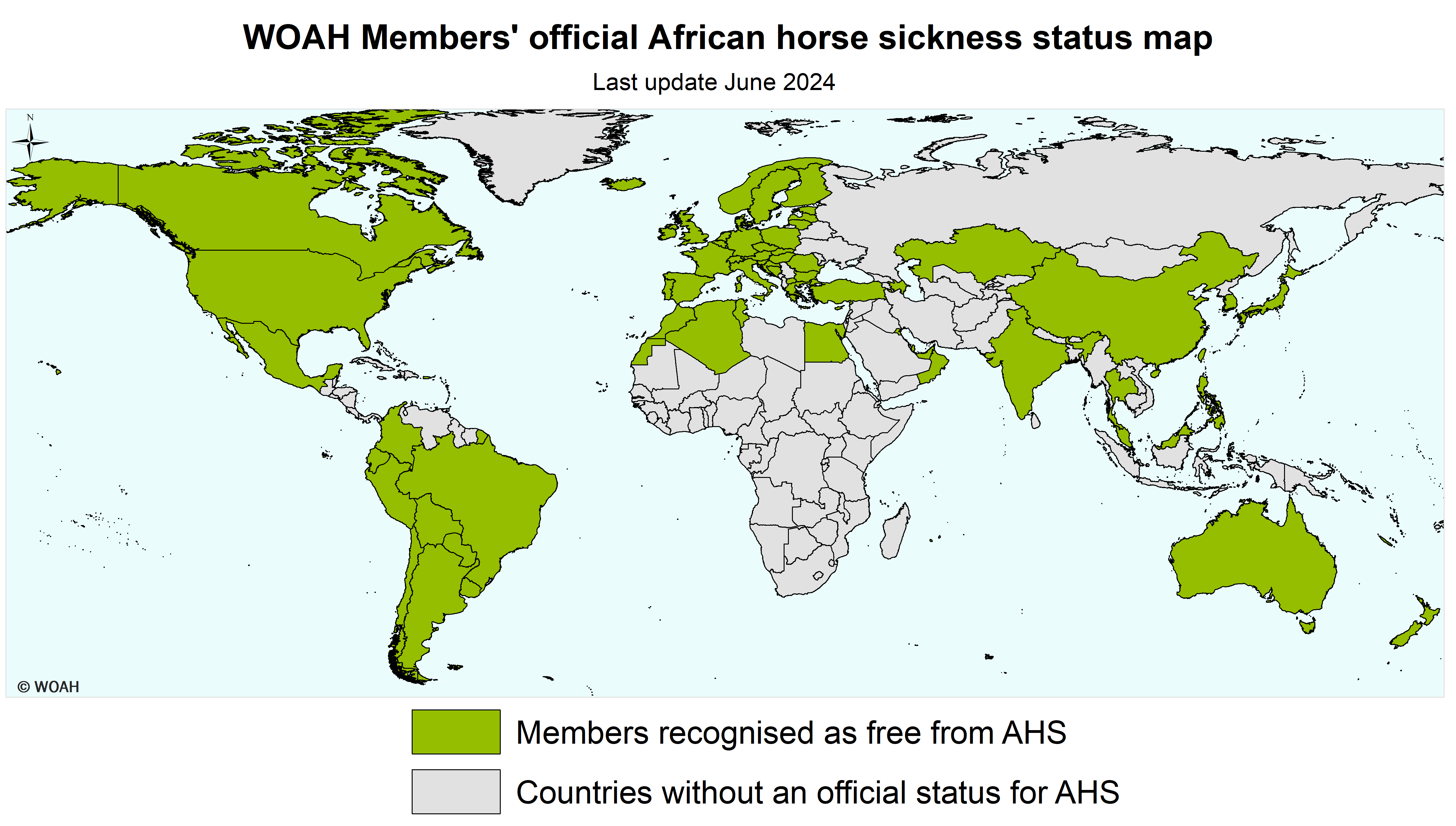African horse sickness
African horse sickness (AHS) is an infectious but non-contagious arthropod-borne viral disease affecting all species of equidae caused by an orbivirus of the family Reoviridae and characterised by alterations in the respiratory and circulatory functions. AHS is transmitted by at least two species of Culicoides. Nine different serotypes have been described. There are four classical clinical forms of AHS: pulmonary, cardiac, mixed, and horse sickness fever. The peracute, pulmonary form occurs in fully susceptible animals and has a short course and a high mortality rate. The cardiac, oedematous form has a more subacute course with mortality reaching 50%. The mixed, acute form is most commonly seen and has features of both the cardiac and pulmonary forms. Mortality can reach 70%. Horse sickness fever is an often overlooked, mild form of the disease and is seen in resistant equidae such as zebra and donkeys. Attenuated (monovalent and polyvalent) live vaccines for use in horses, mules and donkeys, are currently commercially available. There is no evidence that humans can become infected with any field strain of AHSV, either through contact with naturally or experimentally infected animals or by virus manipulation in laboratories.
Links to Code and Manual
-
Terrestrial code
-
Terrestrial manual
In accordance with the procedure for official recognition of disease status, this page provides access to the List of Members officially recognised free from African horse sickness (AHS) by the World Organisation for Animal Health (WOAH, founded as OIE) through the adoption of a resolution by the World Assembly of Delegates (Assembly) of the WOAH at the General Session in May every year.
A Member wishing to be officially recognised as disease-free by the WOAH should submit the questionnaire laid out in Chapter 1.6. of the WOAH Terrestrial Animal Health Code (Terrestrial Code) and comply with all requirements specified in the Terrestrial Code for AHS. The WOAH Scientific Commission for Animal Diseases (Scientific Commission) is responsible for undertaking, on behalf of the World Assembly, the assessment of WOAH Members’ applications for their compliance with WOAH standards. The assessment carried out by the Scientific Commission is based on the recommendations formulated by a relevant ad hoc Group composed of world specialists in disease control.
-
Questionnaire
A_Questionnaire_AHS
.docx – 89 KB See the document
Subsequent to a disease outbreak or when the Scientific Commission determines that the conditions are not met anymore to demonstrate compliance with the relevant requirements of the Terrestrial Code, a disease status may be suspended. The Scientific Commission may decide to reinstate the suspended status when a Member has submitted an application which fulfils all the requirements requested for the recovery of official disease status laid out in the relevant Chapters of the Terrestrial Code. The suspensions and recoveries of disease status are announced by the Director General of the WOAH in consultation with the Scientific Commission and the list of these is kept up to date until adoption of a new resolution by the Assembly the following May.
Members with a disease free status officially recognised by the WOAH must submit an annual reconfirmation form by the end of November every year.
-
.docx – 50 KB See the document
Map of AHS official status
List of AHS free Members
According to Resolution No. 24 (91st General Session, May 2024)
Members recognised as free from AHS according to the provisions of Chapter 12.1. of the Terrestrial Code :
| Algeria | Cyprus | Kuwait | Portugal (4) |
| Andorra | Czech Rep. | Latvia | Qatar |
| Argentina | Denmark | Liechtenstein | Romania |
| Australia | Ecuador | Lithuania | Singapore |
| Austria | Egypt | Luxembourg | Slovakia |
| Azerbaijan | Estonia | Malaysia | Slovenia |
| Bahrain | Finland (2) | Malta | Spain (5) |
| Belgium | France (3) | Mexico | Sweden |
| Bolivia | Germany | Morocco | Switzerland |
| Bosnia and Herzegovina | Greece | New Caledonia | Thailand |
| Brazil | Hungary | New Zealand | The Netherlands |
| Bulgaria | Iceland | North Macedonia (Rep. of) | Tunisia |
| Canada | India | Norway | Türkiye |
| Chile | Ireland | Oman | United Arab Emirates |
| China (Peop. Rep. of) (1) | Italy | Paraguay | United Kingdom (6) |
| Chinese Taipei | Japan | Peru | United States of America (7) |
| Colombia | Kazakhstan | Philippines | Uruguay |
| Croatia | Korea (Rep. of) | Poland |
(2) Including Åland Islands.
(3) Including French Guiana, Guadeloupe, Martinique, Mayotte, Réunion, Saint Barthélémy, Saint Martin, Saint Pierre and Miquelon.
(4) Including Azores and Madeira.
(5) Including Balearic Islands and Canary Islands.
(6) Including Cayman Islands, Guernsey (incl. Alderney and Sark), Isle of Man, Jersey, Saint Helena and Falkland Islands (Malvinas). (A dispute exists between the Government of Argentina and the Government of the United Kingdom of Great Britain and Northern Ireland concerning sovereignty over the Falkland Islands (Malvinas) (see resolution 2065 (XX) of the General Assembly of the United Nations)..
(7) Including American Samoa, Guam, Northern Mariana Islands, Puerto Rico and US Virgin Islands.





